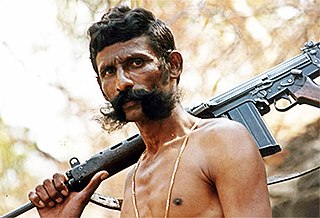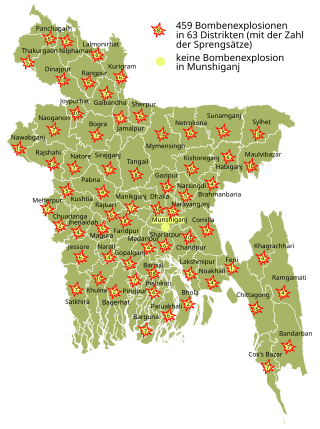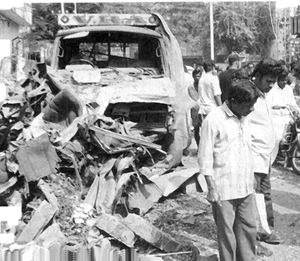Related Research Articles
The Students' Islamic Movement of India is a banned terrorist organisation that was formed in Aligarh, Uttar Pradesh in April 1977. The stated mission of SIMI is the "liberation of India" by converting it to an Islamic land, or Dār al-'Islām. The SIMI, an organisation of extremists has declared Jihad against India, the aim of which is to establish Dār al-'Islām by converting everyone to Islam.

Koose Munusamy Veerappan(Tamil-வீரப்பன்) was an Indian Tamil criminal who was active for 36 years from 1968 to 2004. He was charged with sandalwood smuggling and poaching of elephants in the scrub lands and forests in the states of Tamil Nadu, Karnataka and Kerala. He was wanted for killing approximately 184 people, about half of whom were police officers and forest officials. He was also responsible for poaching approximately 500 of the 2000 elephants killed in the peninsular region where he was active and for smuggling ivory worth US$2.6 million and about 65 tons of sandalwood worth approximately US$22 million.

Terrorism in India, according to the Home Ministry, poses a significant threat to the people of India. Compared to other countries, India faces a wide range of terror groups. Terrorism found in India includes Islamist terrorism, ultranationalist terrorism, and left-wing terrorism. India is one of the countries most impacted by terrorism.

On 17 August 2005, around 500 bomb explosions occurred at 300 locations in 63 out of the 64 districts of Bangladesh. The bombs exploded within a half-hour period starting from 11:30 am. A terrorist organization, Jama'atul Mujahideen Bangladesh (JMB) claimed responsibility for the bombings. The group, led by Shaykh Abdur Rahman and Siddique ul-Islam. Another terrorist group, named Harkat-ul-Jihad al-Islami, was associated with JMB in executing the co-ordinated attack. Following the bombings, both groups were banned by the BNP Government of Bangladesh.
An encounter killing, often simply called an encounter, is an extrajudicial killing by police or the armed forces in South Asia, supposedly in self-defence when they encounter suspected gangsters or terrorists. The officers typically described the incidents as a shootout situation, often allegedly starting when a criminal grabs for the gun of a police officer. The term encounter came into widespread use for such incidents in the late 20th century.

The 1998 Coimbatore bombings occurred on Saturday, 14 February 1998, in the city of Coimbatore, Tamil Nadu, India. A total of 58 people were killed and over 200 injured in the 12 bomb attacks in 11 places, all within a 12 kilometres (7.5 mi) radius. The explosives used were found to be gelatin sticks activated by timer devices and were concealed in cars, motorcycles, bicycles, sideboxes of two-wheelers, denim and rexine bags, and fruit carts. Several bombs that failed to detonate were defused by bomb disposal squads of the Army, National Security Guards and Tamil Nadu Commando School. The bombings were apparently in retaliation to the 1997 Coimbatore riots during November – December the previous year, when Hindu fundamentalists groups killed 18 Muslims and 2 Hindus and looted several thousands of properties of Muslims following the murder of a traffic policeman named Selvaraj, by a member of the radical Islamist group Al Ummah. The main conspirator was found to be S A Basha, the founder of Al Ummah, an Islamic fundamentalist body. Investigators found out that the blasts were a part of larger conspiracy to target L.K.Advani, the leader of Bharatiya Janata Party on that day at 4 p.m in his election meeting.

This is a timeline of Pakistani history, comprising important legal and territorial changes and political events in the region of modern-day Pakistan. To read about the background of these events, see History of Pakistan and History of the Islamic Republic of Pakistan.

Harkat-ul-Jihad-al-Islami is a Pakistani Islamist extremist, fundamentalist and terrorist organisation affiliated with Al-Qaeda and the Taliban.
The Mecca Masjid blast occurred on 18 May 2007 inside the Mecca Masjid, a mosque located in the old city area of Hyderabad, capital of the Indian state of Telangana located very close to Charminar. The blast was caused by a cellphone-triggered pipe bomb placed near the site designated for ablution. Two further live IEDs were found and defused by the police. Sixteen people were reported dead in the immediate aftermath, of whom five were killed by the police firing after the incident while trying to quell the mob angered by what they considered police failure to protect the Muslims during their worship.
The Hyderabad bombings refers to the incident in which two bombs exploded almost simultaneously on 25 August 2007 in Hyderabad, capital of the Indian state of Andhra Pradesh. The first bomb exploded in Lumbini Amusement Park at 19:45 hrs IST. The second bomb exploded five minutes later at 19:50 in Gokul Chat Bhandar in Koti, a popular restaurant about 5 kilometres (3 mi) away. At least 42 people were reported to have died in the two bombings. Two more bombs were defused in other parts of the city. According to initial reports, the banned Harkat-ul-Jihad-al-Islami militant outfit of Bangladesh is suspected for the serial blasts.
2008 Bangalore serial blasts occurred on 25 July 2008 in Bangalore, India. A series of nine bombs exploded in which 1 person was killed and 20 injured. According to the Bangalore City Police, the blasts were caused by low-intensity crude bombs triggered by timers.
Indian Mujahideen (IM) is an Islamist terrorist group which has been particularly active in India. The jihadist group was founded as an offshoot of the Students' Islamic Movement of India (SIMI) by several radicalized members including Iqbal Bhatkal, Riyaz Bhatkal, Yasin Bhatkal, Abdul Subhan Qureshi, Amir Reza Khan and Sadiq Israr Sheikh, among others. It has been active since at least 2005 when it bombed the Dashashwamedh Ghat in Varanasi. It carried out several serial-bombings in Indian cities in the following years notably the 2007 Uttar Pradesh bombings, 2008 Jaipur bombings, 2008 Ahmedabad bombings, 2008 Delhi bombings, 2010 Pune bombing, 2011 Mumbai bombings, 2011 Delhi bombing, 2013 Patna bombings, 2013 Hyderabad blasts and the 2013 Bodh Gaya bombings.
Sarfraz Ahmed Naeemi Shaheed,, was a Sunni Islamic cleric from Pakistan who was well known for his moderate and anti-terrorist views. He was killed in a suicide bombing in Jamia Naeemia Lahore, Lahore, Pakistan on 12 June 2009, after publicly denouncing the Tehrik-i-Taliban's terrorist actions and ideologies as unislamic.
The 2011 Delhi bombing took place in the Indian capital Delhi on Wednesday, 7 September 2011 at 10:14 local time outside Gate No. 5 of the Delhi High Court, where a suspected briefcase bomb was planted. The blast killed 15 people and injured 79. Harkat-ul-Jihad al-Islami claimed responsibility for the attack, and is believed to have carried out the attack with support from the Indian Mujahideen, it stated motive was the commuting of the death sentence for 2001 Indian Parliament attack convict Afzal Guru.

On 2 October 2014, an explosion occurred in a house in the Khagragarh locality of Burdwan. Two terrorists were killed and a third injured. The police seized 55 improvised explosive devices, RDX, wrist watch dials and SIM cards.

Bangladesh has experienced terrorism in the past conducted by a number of different organisations. In the past, both ISIL and other terrorist organisations had claimed to be active in the country. However, the Bangladeshi government believes that they mainly operated through local affiliates, before being neutralised by security forces.
Darsgah-Jihad-O-Shahadat is an Islamist group based in the southern Indian city of Hyderabad, with branches in the state of Kerala. The group claims to have trained about 50,000 people in self-defence techniques at its training camps in Hazrat Ujale Shah Idgah grounds at Saidabad and Purani Haveli.

Islamic State – Bengal Province (IS-BP) is an administrative division of the Islamic State, a Salafi jihadist militant group and former unrecognised Quasi-state. The group was announced by ISIL as its province in 2016. The first emir of Wilayat al-Bengal, Abu Ibrahim al-Hanif, is believed to be Mohammad Saifullah Ozaki a Bangladeshi Japanese economist who went to Syria in 2015 and joined IS. A Hindu convert to Islam, he reportedly led the 2016 Dhaka attack. He was detained in Iraq in 2019 and Abu Muhammed al-Bengali was announced as the new emir of the province.
References
- ↑ "Blast in police task force office; 2 killed - Rediff.com India News". In.rediff.com. 12 October 2005. Retrieved 19 February 2018.
- ↑ Jafri, Syed Amin (13 October 2005). "Hyderabad blast could be suicide bomb". Rediff.com. Retrieved 4 November 2018.
- ↑ "Hyderabad suicide bombing case: 12 years later, 10 acquitted in Hyderabad suicide bombing case". Timesofindia.indiatimes.com. Retrieved 19 February 2018.
- ↑ "LeT ultra involved in Varanasi blasts killed in encounter". Dnaindia.com. 8 March 2006. Retrieved 19 February 2018.
- ↑ "Terrorist Shahid Bilal dead: IB". Rediff.com. Retrieved 19 February 2018.
- ↑ "Madannapet, Saidabad: The twin trouble spots | Hyderabad News". The Times of India. 10 April 2012. Retrieved 19 February 2018.
- ↑ "Hyderabad: Huji suicide blast case drags on for 11 years". Deccanchronicle. Retrieved 19 February 2018.